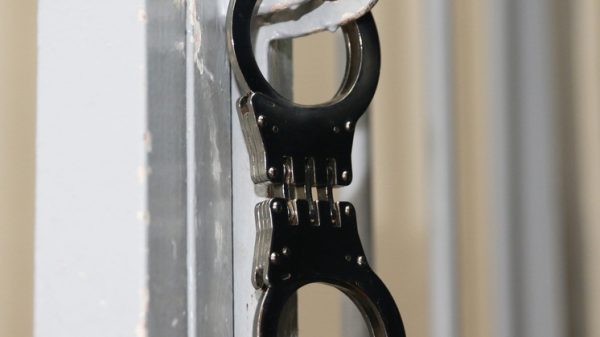At least 11 migrant women were dropped off in Mexican border towns without birth certificates for their days-old US citizen newborns since March of last year, an investigation by the Fuller Project and the Guardian has found.
Based on multiple conversations with lawyers who work with asylum seekers at the border and a review of hospital records and legal documents, multiple US citizen newborns were removed to Mexico after their mothers were subject to a Trump-era border ban that the Biden-Harris administration has been slow to rescind.
Exclusive: Ice cancels deportation flight to Africa after claims of brutality
Read more
Advocates suspect the actual number of such cases could be higher because the vast majority of these fast-track “expulsions”, as the administration calls them, have occurred away from the public eye and without the involvement of lawyers.
This recent pattern of removal of US citizens without birth certificates has occurred against the backdrop of immigration policies and practices in recent years that have harmed already vulnerable women and children, advocates and lawyers say.
Former president Donald Trump’s administration’s “zero tolerance” policy, which resulted in more than 5,000 children being separated from parents, and the rise in prolonged detention of children were the most visible policies, but represented only the tip of the iceberg. Homeland security agencies also detained 4,600 pregnant women between 2016 and 2018, with the number increasing by 52% between those two years. Several detained women have also complained of miscarriages and intrusive medical procedures.
Hélène*, a 23-year-old woman from Haiti, was nine months pregnant when she crossed into the United States in July 2020. She was in the custody of the US border patrol when her water broke. Agency officials transported her to a local hospital in Chula Vista, California, to give birth. She was happy when her baby girl was born – that everything went smoothly, she told the Fuller Project and the Guardian in a phone conversation through a translator.
Three days later, they were discharged. Hélène remembers thinking that she would be released to family and allowed to pursue her asylum case, she said. But 25 or so minutes later, she was back in Mexico, at the very border she arrived at a few days ago, pregnant at the height of summer, after a journey that lasted one month and three days. Panicking, she began to cry. She pleaded in Spanish to the Customs and Border Protection (CBP) officers who had driven her across the border. She knew they understood, she says. The officers did not respond.
They dropped her off across from the San Diego-Tijuana border, on the side of the road. She had no idea what to do or where to go. She also didn’t have her newborn’s birth certificate. When night fell, she and her baby slept right there on the street, on the other side of safety.
Hélène was subject to Title 42, a Centers for Disease Control and Prevention order issued during the beginning of the government’s federal actions against the Covid-19 pandemic last March. The rule allowed CBP officials to summarily “expel” all migrants who entered the US without authorization, instead of letting them access the legal avenue to request protection, even those seeking asylum.
Fast deportations have happened before at the border but typically immigrants have had the right to be screened for asylum claims and to see an immigration judge if they are likely to face harm upon removal. Title 42 allows authorities to turn away people summarily. However, officials can exempt people on a case-by-case basis and grant entry in case of humanitarian or public interest considerations.
“Immigration [agencies have] the authority to be able to prevent that from happening but they’re refusing to do that,” said Luis M Gonzalez, a lawyer with the Jewish Family Services, who has represented two cases in which migrant mothers and their US citizen newborns were expelled. “They are placing [the] lives of US citizens in danger. In this case, newborns.”
In fiscal year 2020, CBP reported over 200,000 expulsions – including unaccompanied children – were turned back under the Title 42. In the first three months of fiscal year 2021 alone, expulsions have exceeded 190,000, to date. The Trump administration hailed Title 42 as “tremendously effective”.
On 2 February, Joe Biden issued an executive order directing his officials to “promptly review” Title 42 among other border policies. But advocates have been frustrated that more decisive, quicker action hasn’t already been taken. On 29 January, a three-judge panel comprising conservative judges appointed by Trump overturned a lower court decision to block the rule from applying to unaccompanied minors.
In a statement Tuesday, Omar Jadwat, director of the American Civil Liberties Union’s Immigrants’ Rights Project, called it “troubling” that Biden’s orders “did not include immediate action to rescind and unwind more of the unlawful and inhumane policies that this administration inherited – and now owns”.
A CBP spokesperson, who asked the information she provided be attributed to the agency, said the agency does not track how many women with US citizen newborns were subject to Title 42 and declined to answer other questions about such cases. “Per policy, CBP does not comment on individual cases due to privacy reasons,” the spokesperson, who asked not to be named, said via email.
They added: “Hospitals are responsible for providing birth certificates and CBP does not hinder individuals, regardless of immigrations status, from acquiring birth certificates for US citizen children.”
CBP also told a local reporter last year that at least one new mother from Honduras was given the option to give her baby up to US child services before returning to Mexico.
“That’s not really a choice,” said Mitra Ebadolahi of the American Civil Liberties Union of San Diego, who along with Gonzalez from Jewish Family Services, filed a complaint to the Department of Homeland Security Office of Inspector General last summer asking for an investigation into the case of this Honduran mother.
The Honduran woman, her husband and their nine-year-old, had turned themselves in to border patrol agents last June when the woman was nine months pregnant. The family had already been turned back to Mexico once in March before Title 42 came into effect. During their time in Mexico, they were threatened by armed men and “endured significant personal and material insecurity”, according to the 10 July complaint.
The woman, experiencing acute pain due to her late-term pregnancy, was taken to the hospital in Chula Vista, California, while her partner and son were expelled to Tijuana, Mexico, a city the state department itself notes is a hot spot for targeted homicides and turf wars. Two days later, the woman and her baby were also sent to Tijuana.
In another case Gonzalez represented, a migrant woman who had undergone a C-section, an invasive procedure that takes weeks to heal, was nevertheless removed to Mexico within the week of her surgery, along with her newborn. Gonzalez later successfully petitioned authorities to allow both families to enter on humanitarian grounds.
“I know it’s cliche, but there’s a very Kafka-esque quality to these processes that really scrubs out the humanity of the migrants’ experiences,” Ebadolahi said. “I have struggled to come up with language that adequately conveys the harm and the damage done.”
Natalia*, 24, wakes up in her apartment in Reynosa, Tamaulipas, across the border from McAllen, Texas, where she gave birth to her baby girl last April. Throughout the day, she takes care of the baby and her four-year-old son. If she is able to get to America in the future, the first thing she wants to do is get her hands on her toddler’s birth certificate, which she still didn’t possess in early January when she last spoke to the Guardian.
Issues can arise for mothers in her position: they can have a hard time getting their children vaccinated and registered for early education, and have issues obtaining food assistance and other government benefits, said Nicole Ramos, director of Al Otro Lado’s Border Rights Project, a legal services organization for migrants.
“For all intents and purposes, that child is stateless, which is going to create a whole host of barriers … because they’re unable to establish citizenship,” said Ramos, who says her organization has dealt with nine such cases including Hélène’s and Natalia’s.
In the last two years, camps have mushroomed along the US-Mexico border to house families stuck in limbo due to Trump’s border policies, who struggle with access to basic services like food, clean water and medical help.
Human Rights First, an advocacy organization, has documented more than 1,300 cases of violent assaults, kidnappings, rapes and murders among migrants placed in the Migrant Protection Protocols – through which migrants are made to wait in Mexico for their US court hearings, now suspended during the pandemic.
Through this time, border shelters in Mexico have become more strained and hospitals more crowded. Desperate, many migrants have tried to cross into the United States again, only to be sent back under Title 42.
New claims of migrant abuse as Ice defies Biden to continue deportations
Read more
All of these policies put people who have already suffered significant trauma through repetitive cycles of harm, advocates say.
“It has become really clear that the right to life protection of the children is about protecting white, Christian children … not about brown children born to immigrant mothers,” Ramos says.
On 3 February, the Washington Post reported Mexico revealed, not publicly, they would stop accepting Central American families expelled by the US, but would continue to accept single adults.
In January, as Natalia’s baby girl cooed and fussed, she said she’d like Americans to know: border officials told her before her expulsion to Reynosa that her daughter would not be able to get a birth certificate because she was born to parents who were migrants without rights. Her daughter would not have rights either, they said.
*Names have been changed on the request of immigration lawyers, because both women are fleeing persecution.
-
This story is published in partnership between the Guardian and the Fuller Project. Tanvi Misra is a contributing reporter to the Fuller Project, a non-profit newsroom that reports on issues that affect women.

























































Свежие комментарии